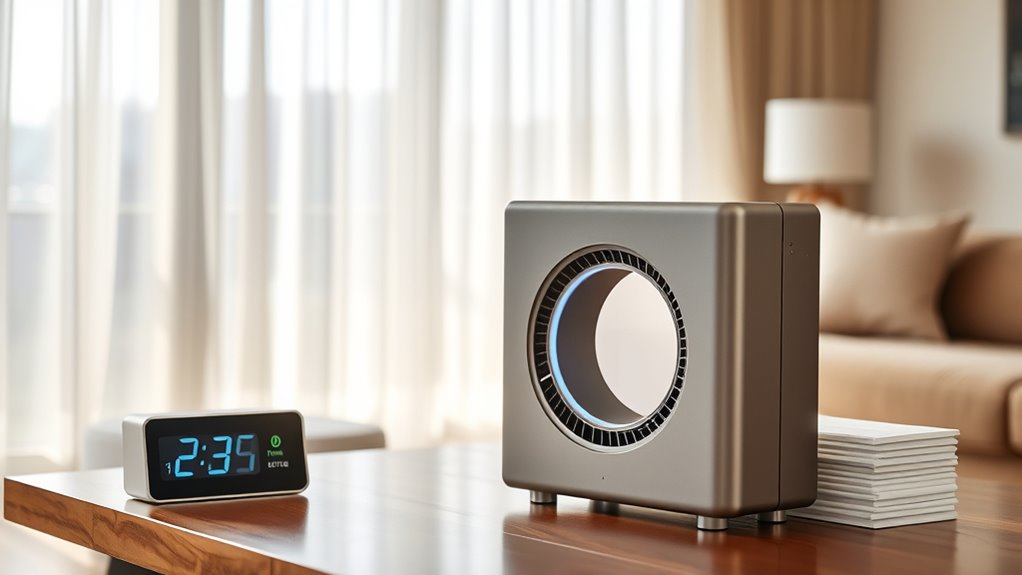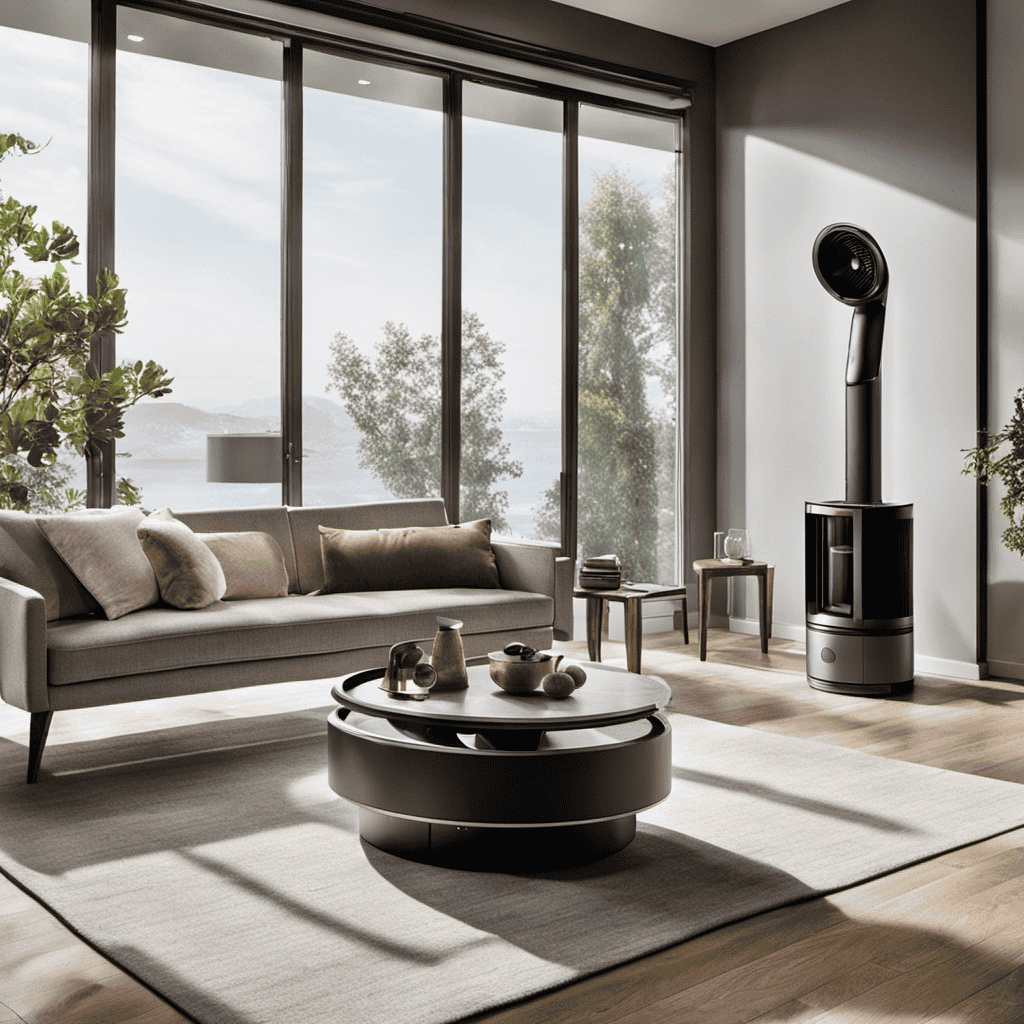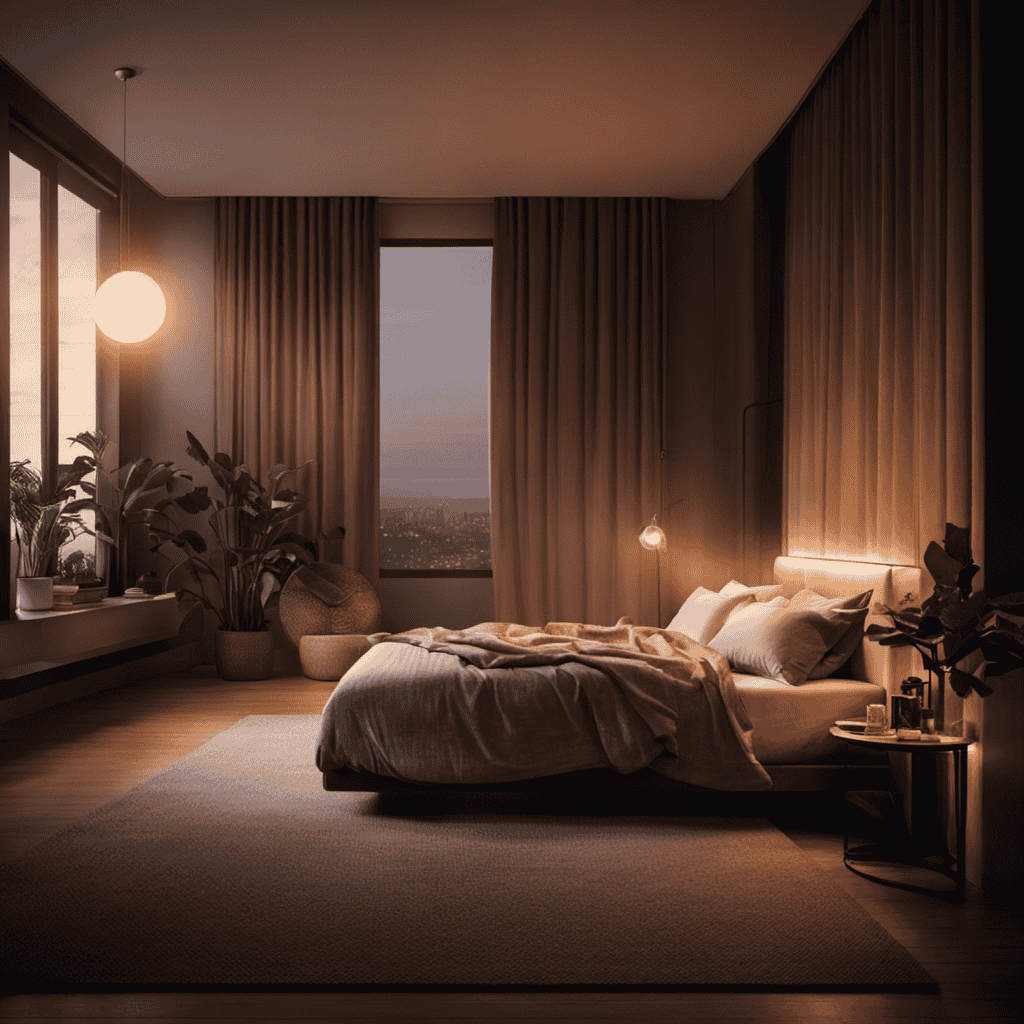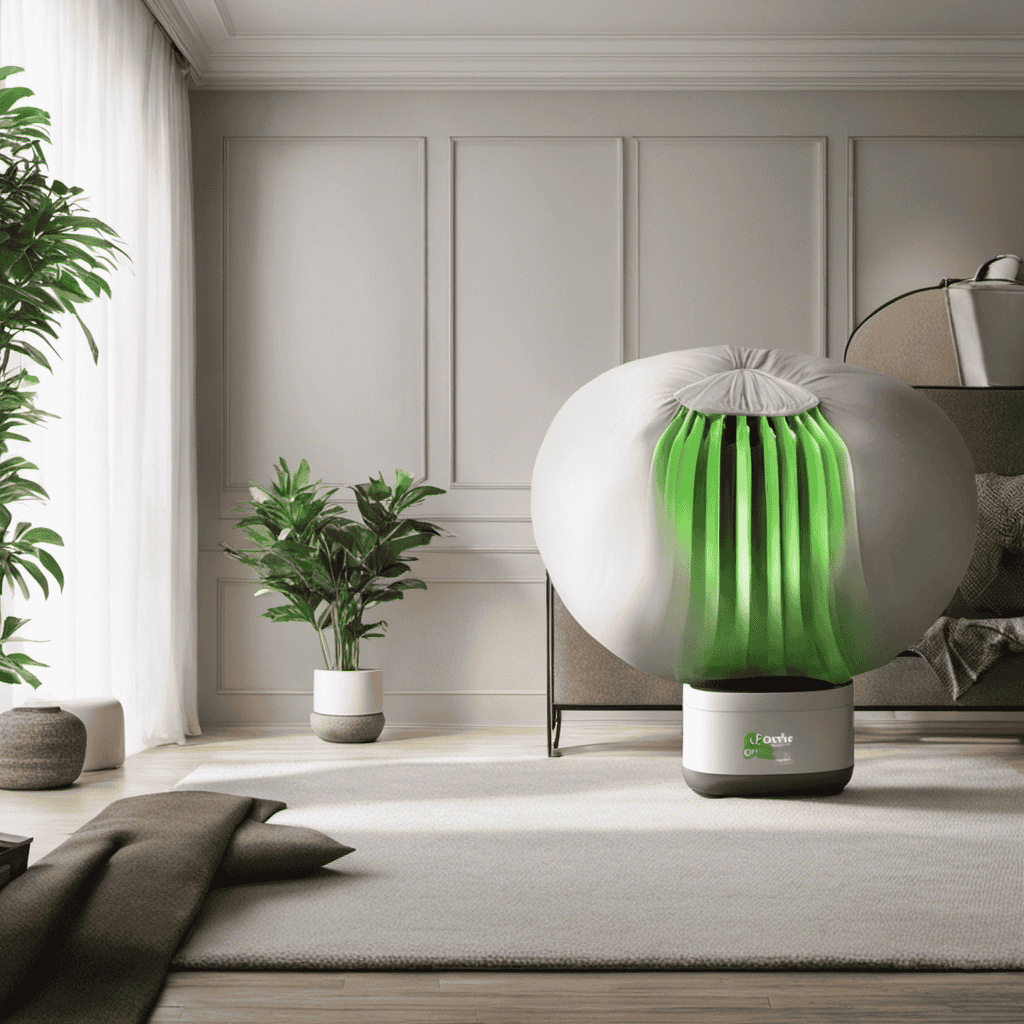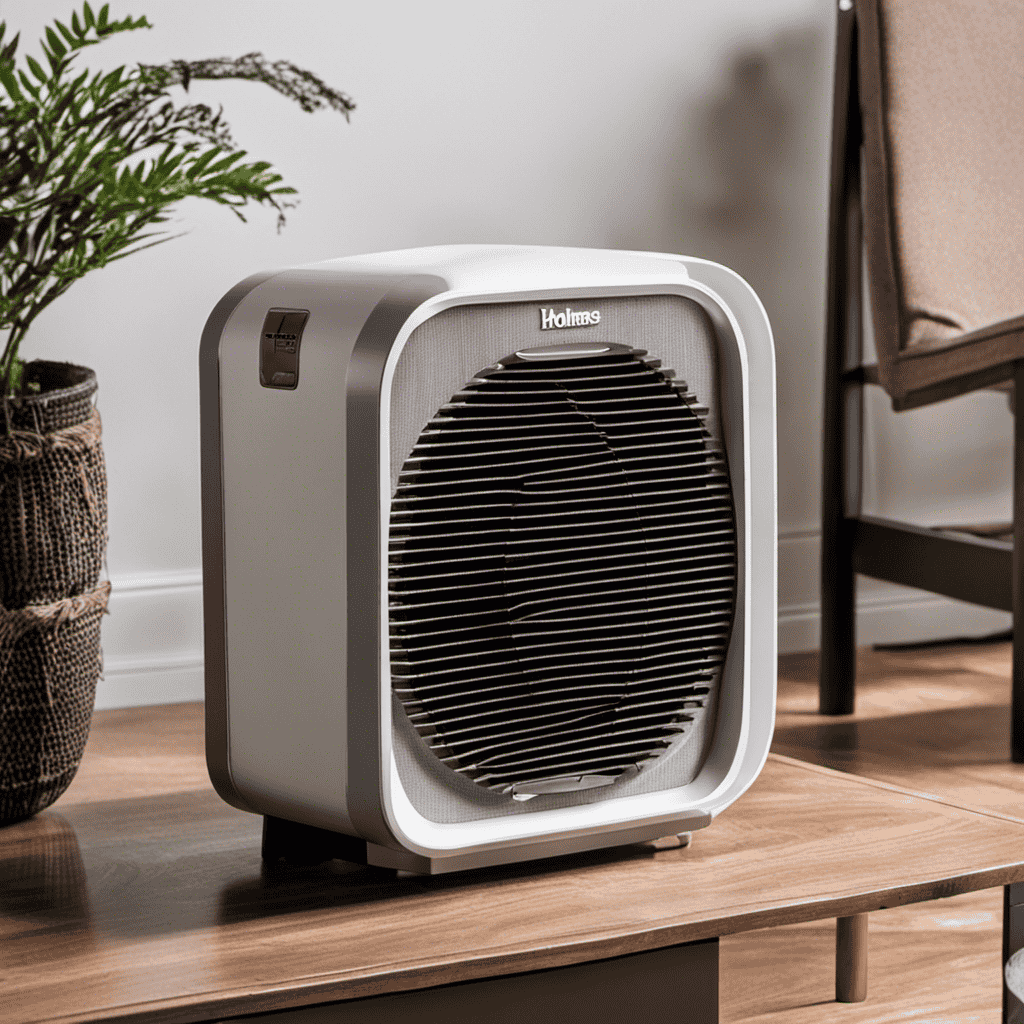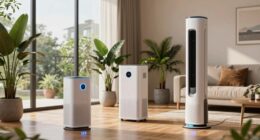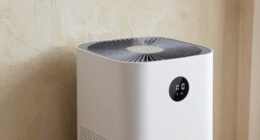Air purifiers usually last between three and five years, but their lifespan depends on proper maintenance, regular filter changes, and how often you use them. Neglecting filters or overworking the unit can shorten its life, while good placement and cleaning can extend it. Signs it’s time to replace include reduced efficiency, strange noises, or persistent odors. Keep these tips in mind to get the most from your purifier, and learn more about prolonging its lifespan.
Key Takeaways
- Most air purifiers last between 3 to 5 years, depending on usage and maintenance.
- Regular filter replacement prevents decreased efficiency and extends the unit’s lifespan.
- Signs indicating it’s time to replace include reduced air quality, increased noise, and persistent odors.
- Proper placement, cleaning, and timely filter changes help prolong the device’s durability.
- Upgrading to energy-efficient models with easy maintenance can enhance longevity and performance.
Typical Lifespan of Air Purifiers
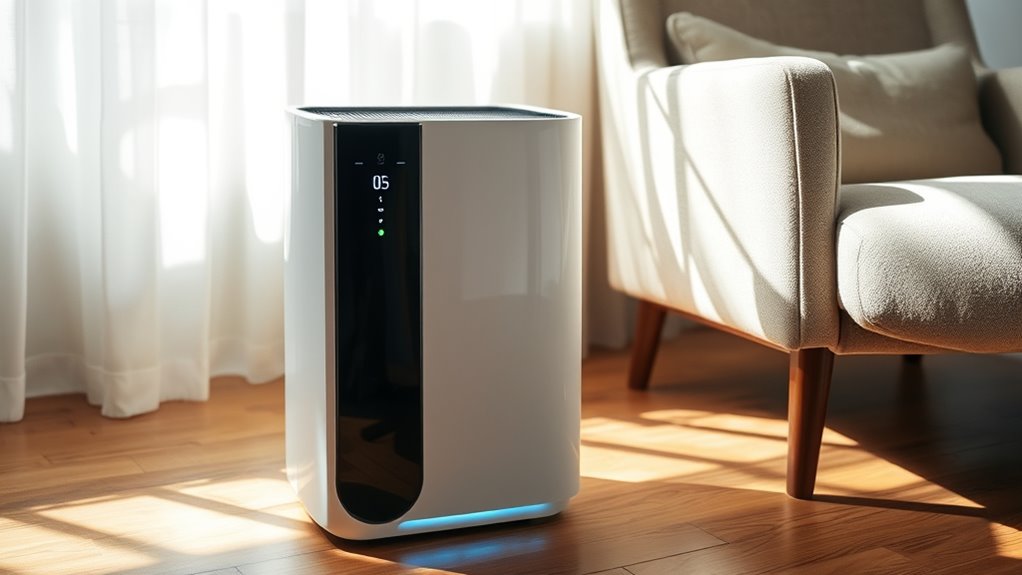
The typical lifespan of an air purifier generally ranges from 3 to 5 years, though it can vary based on usage and maintenance. Regular filter replacement is vital to keep your unit functioning at its best and to maintain energy efficiency. When filters become clogged or dirty, the purifier has to work harder, which can reduce its lifespan and increase energy consumption. By sticking to the manufacturer’s recommended filter replacement schedule, you help guarantee your air purifier remains effective and energy-efficient over time. Proper maintenance not only prolongs its life but also improves indoor air quality. Keep an eye on filter condition and replace them promptly to maximize your unit’s durability and performance within its expected lifespan. Additionally, choosing a multi-functionality unit can enhance filtration efficiency and extend the overall lifespan of your device. Recognizing the signs of wear and tear early can also help prevent unexpected breakdowns and ensure consistent air purification. Regularly inspecting your unit for component damage can further help in maintaining optimal operation and prolonging its useful life.
Factors That Affect Durability
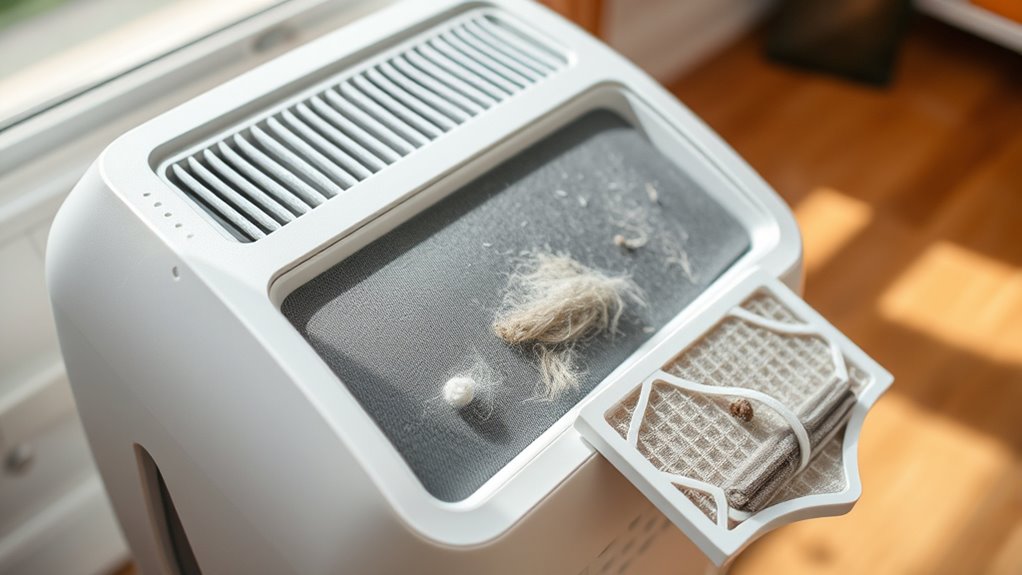
Several factors can influence how long your air purifier lasts, and understanding these can help you extend its durability. One key factor is filter maintenance; regularly replacing or cleaning filters ensures the unit operates efficiently and prevents strain on its components. Neglecting filter upkeep can lead to reduced airflow and increased wear. Additionally, energy efficiency plays a role—using your purifier correctly and avoiding overuse can minimize stress on parts, prolonging its lifespan. Proper placement and avoiding dust buildup also help maintain ideal performance. When you prioritize filter maintenance and operate your unit with energy efficiency in mind, you reduce unnecessary strain and extend its lifespan. Regularly monitoring device performance can also help identify issues early, further extending the lifespan of your air purifier. Furthermore, choosing a model with quality components can contribute to longer-lasting operation. Being aware of brand-specific deep cleaning techniques can also prevent premature wear and tear, ensuring your purifier remains effective for years. Staying informed about manufacturer recommendations can further help you optimize maintenance routines and extend your unit’s life. Ultimately, these practices help your air purifier serve you well for years to come.
Signs It’s Time to Replace Your Unit
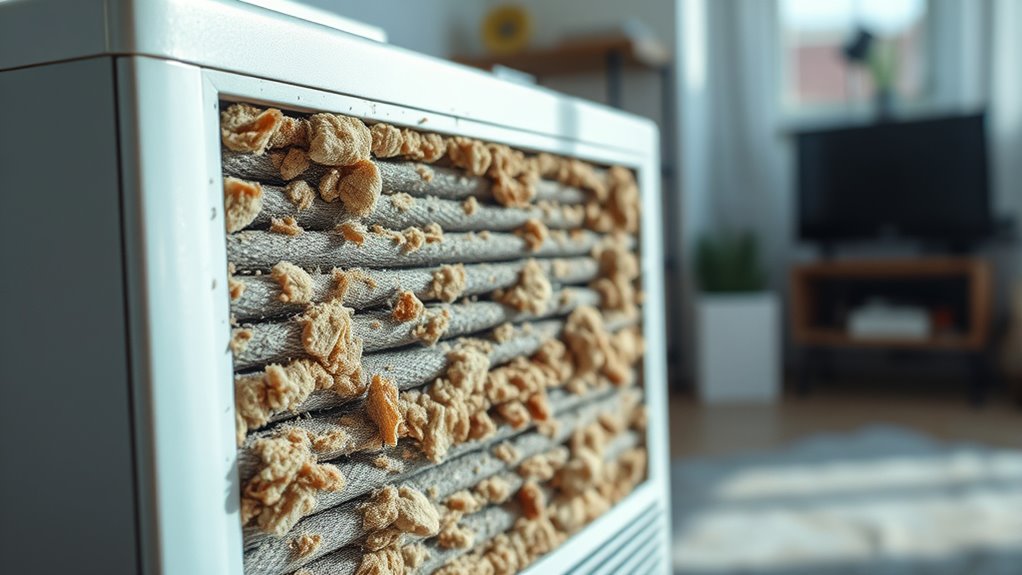
Over time, even with diligent filter maintenance and proper use, your air purifier may show signs it’s nearing the end of its lifespan. One key indicator is reduced efficiency; if your unit isn’t improving air quality as it used to, it’s a red flag. Pay attention to increased noise levels, which often suggest internal components are wearing out or malfunctioning. Additionally, if your filter maintenance routine no longer restores peak performance, it may be time to replace the unit. Unusual odors or persistent strange sounds are also signs that your air purifier isn’t functioning properly. Recognizing these signs early helps ensure you maintain good air quality and avoid overworking a failing unit. When these issues arise, consider replacing your air purifier for better performance. Regular filter replacement and monitoring HEPA filtration effectiveness can help extend the lifespan, but once these signs appear, a new unit might be necessary. It’s also beneficial to evaluate the seasonal maintenance schedule to ensure your device is operating optimally. Being aware of the device lifespan can help you plan for timely replacement. Proper use and manufacturer recommendations can also play a significant role in maximizing your unit’s longevity. Additionally, be aware that retail store hours can impact your ability to purchase a replacement promptly.
How to Extend the Life of Your Air Purifier
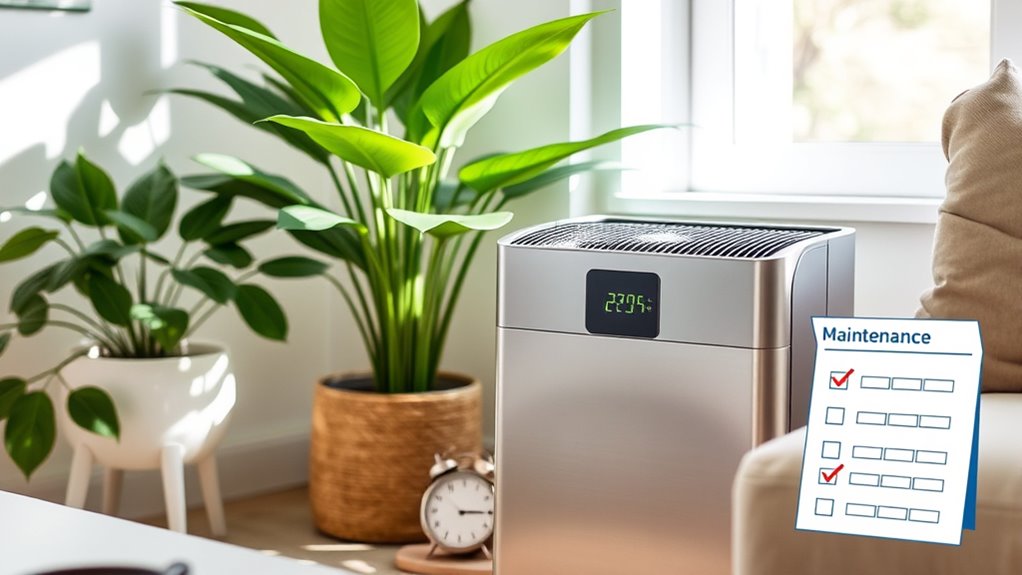
To get the most out of your air purifier, you need to follow proper maintenance routines and use it correctly. Regularly cleaning the exterior and pre-filters prevents dust buildup that can strain the unit. Adhering to filter replacement schedules is vital; check your manufacturer’s recommendations and replace filters promptly to maintain peak performance. Keep the device in a well-ventilated space, avoiding areas with excessive dust or humidity, which can accelerate wear. Running your air purifier continuously, especially during high pollution or allergy seasons, also helps prevent overworking the unit, extending its lifespan. Proper mechanic shop maintenance and timely filter changes are essential for optimal operation. Additionally, understanding AI vulnerabilities and ensuring your device’s safety features are active can help protect it from potential digital threats. Being aware of performance tuning principles can also help you optimize your unit’s efficiency and longevity. Regularly monitoring air quality indicators can alert you to when maintenance is needed, further prolonging your device’s lifespan. Incorporating market trends related to air purification technology can also inform better choices for your device’s features and updates. Avoiding neglect and staying proactive with maintenance routines ensures your air purifier functions efficiently longer, saving you money and improving indoor air quality over time.
Choosing a New Air Purifier: What to Consider
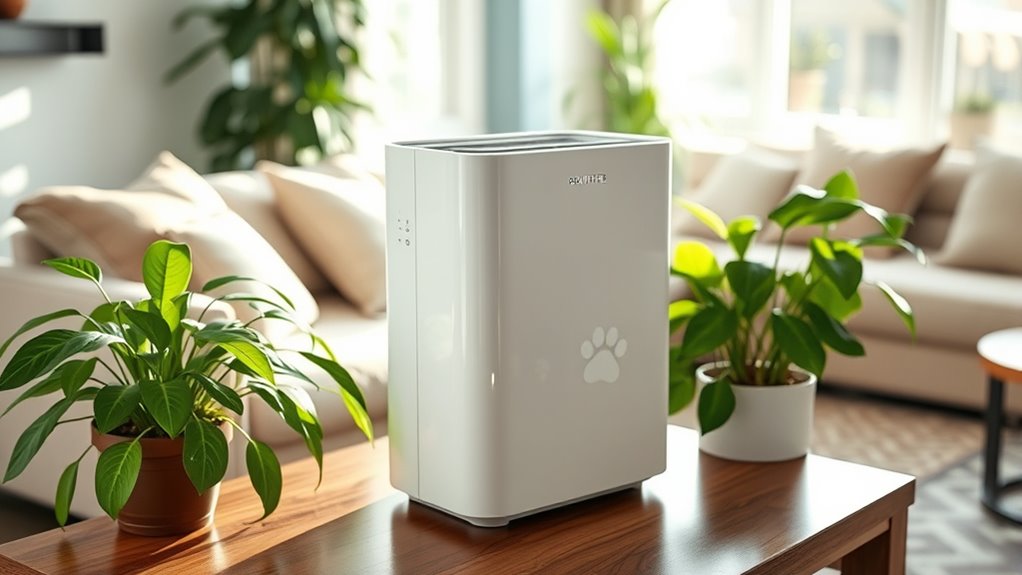
When choosing a new air purifier, it’s essential to take into account your specific needs and the features that will best address them. Consider models with easy filter replacement options, so maintaining your unit remains straightforward and cost-effective. Look for energy efficiency ratings to ensure your purifier consumes less electricity, saving you money over time. Evaluate the type of filters used; HEPA filters are great for allergens, while activated carbon filters target odors and chemicals. Check the CADR (Clean Air Delivery Rate) to match the purifier’s capacity with your room size. Additionally, consider noise levels and smart features like air quality sensors or timers. Making informed choices guarantees your new air purifier effectively improves indoor air quality while remaining economical and simple to maintain. Incorporating filter maintenance techniques from somatic therapy, such as mindfulness practices, can help you stay present and reduce stress while selecting the right unit. Regularly checking and replacing filters based on manufacturer recommendations ensures optimal performance and longevity of your air purifier.
Frequently Asked Questions
Are There Specific Brands Known for Longer-Lasting Air Purifiers?
If you’re wondering about brands with better longevity, some are known for their brand longevity and filter durability. Brands like Dyson, Blueair, and Coway often produce air purifiers with longer-lasting components and reliable performance. You can expect their units to maintain efficiency longer, reducing replacement frequency. Always check user reviews and product specs, but choosing reputable brands can help guarantee you get a durable, long-lasting air purifier.
How Does Frequency of Use Impact an Air Purifier’S Lifespan?
Your usage patterns directly impact your air purifier’s lifespan. If you use it continuously or frequently, the filter replacement frequency increases, which can wear out the unit faster. On the other hand, moderate use extends its life. Regularly monitoring and replacing filters as needed helps maintain efficiency, but heavy and constant use may mean you’ll need to replace your unit sooner. Adjusting usage habits can help prolong its effective life.
Can Outdoor Environmental Factors Shorten an Air Purifier’S Durability?
You might think outdoor pollution won’t affect your air purifier, but it can substantially shorten its durability. Outdoor environmental factors like dust, pollen, and pollutants increase the air quality impact, causing your unit’s filters to clog faster. This accelerates wear and tear, reducing its lifespan. Regularly maintaining and replacing filters helps, but minimizing outdoor pollution exposure will keep your air purifier working longer and more efficiently.
Do Different Room Sizes Affect How Often I Need to Replace Filters?
Room size directly impacts your filter replacement schedule. Larger rooms may require more frequent filter changes because the air purifier works harder to clean the space. Smaller rooms might need less frequent filter replacement since the device doesn’t have to run at full capacity as often. Keep an eye on your filter indicator or follow the manufacturer’s guidelines to guarantee the best air quality and maintain your unit’s performance.
Is There a Recommended Maintenance Schedule to Maximize Lifespan?
You might think air purifiers are set-and-forget, but a solid maintenance checklist proves otherwise. To maximize lifespan, you should replace filters every 3-6 months and clean pre-filters monthly. Keep an eye on filter replacement indicators and follow your unit’s specific advice. Regular maintenance not only boosts performance but also makes sure your purifier keeps breathing easy, proving that even tech needs a little TLC.
Conclusion
Think of your air purifier like a trusty garden hose—over time, it can clog or wear out, reducing its effectiveness. Regular maintenance helps it last longer, but eventually, even the best tools need replacing. When your purifier’s performance drops or it’s been several years, it’s time for a new one. Investing in a fresh unit guarantees your air stays clean and healthy, just like replacing a worn-out hose keeps your garden thriving.
